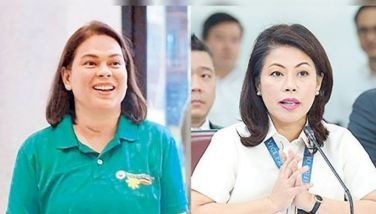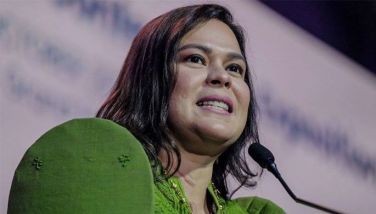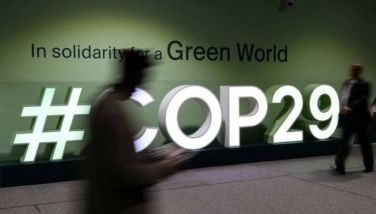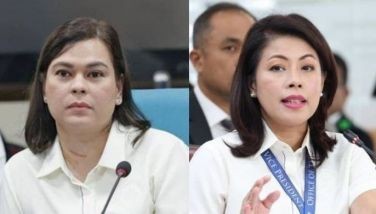Gov't will win war in Mindanao - Estrada
President Estrada assured the nation yesterday that the government will win the war in Central Mindanao as he vowed to restore peace and order in that region at all costs.
Mr. Estrada issued the statement before he left for a five-day visit to China aimed at patching up ties strained by territorial claims and to boost trade and investment.
"Once again, the government has demonstrated its capability and firm resolve to assert Philippine sovereignty in Central Mindanao. As I speak at this hour, the Armed Forces of the Philippines have linked up within the peripherals of the Narciso Ramos Highway to affirm that in this country, there is only one government and one Armed Forces," he said.
"I have no doubt we will win this war," Mr. Estrada added.
While admitting that there have been heavy casualties on both sides, the President said he will never compromise the territorial integrity of the Republic.
"We will not allow barbaric acts and callousness to destroy the nation," he said.
He also vowed to restore peace and order and looked forward to the immediate resolution of the problem.
At the moment, the Chief Executive said the safety of the hostages is his prime concern.
"We will do everything to secure their safe release from the Abu Sayyaf who have been holding them against their will," he said.
Mr. Estrada also said he will be in complete control of the government, more particularly the situation in Mindanao, while he is in China.
"Even though I am not in the country, I will be the one who will lead and run the government because every hour and every day, the Cabinet clusters and the AFP will report to me," he said.
"There is no reason to worry while I am away," the President added.
Political foes have expressed concerns that Mr. Estrada has not demonstrated hands-on leadership at a time when a small band of Muslim extremists is holding 21 hostages, including 10 foreign tourists, and government troops are fighting with the Moro Islamic Liberation Front.
"We remain cognizant of the special concerns of the governments of the foreign nationals being held in captivity," Mr. Estrada said. "While there may be difficulties in securing the hostages' expeditious release, I am confident as I leave for this mission that we shall have a satisfactory resolution upon my return."
In Beijing, Mr. Estrada is to meet with President Jiang Zemin, Premier Zhu Rongji, and Vice President Hu Jintao, who is seen by some observers as Jiang's likely successor as general secretary of China's ruling Communist Party.
Mr. Estrada is expected to bring up the dispute over the Spratlys, a chain of islands, atolls and reefs in the South China Sea that are claimed wholly or partly by the Philippines, China, Malaysia, Taiwan, Brunei and Vietnam.
His official agenda, however, focuses on trade and cooperation.
He is accompanied in his trip by Cabinet members and a 120-strong business delegation composed mainly of Filipino-Chinese businessmen. It is the biggest business team to join the President on an overseas trip.
Nine family members of Abu Sayyaf leader Khadafy Janjalani who were abducted last month by a vigilante group are missing, according to Basilan Vice Gov. Abdulazziz Balamo, head of the province's crisis management committee.
He said even vigilante leader Abdul Lidjal and his men were nowhere to be found in the island-province.
Lidjal is still holding the mother, sister and seven other relatives of Janjalani. They were taken captive by the vigilante group in retaliation for the abduction by the Abu Sayyaf of a group of all-Filipino hostages, mostly teachers and children, from two schools in Basilan last March 20.
Lidjal was last heard to be in the coastal village of Tongsengal in Sumisip town.
On Monday, members of the crisis committee went to the village and found empty huts where Lidjal had kept his captives.
Basilan Gov. Wahab Akbar theorized that Lidjal had moved his captives to another place when the military launched Operation Final Option to rescue hostages held by the Abu Sayyaf in a mountain camp.
Abu Sayyaf rebels had said they would release the ailing German hostage if the vigilantes also freed the relatives of their leader.
"If they want us to free the sick German woman then they should first release the captives held by Lidjal (the vigilante group)," Abu Sayyaf spokesman Abu Ahmad said on Radio Mindanao.
Meanwhile, Muslim congressmen urged Mr. Estrada to stop the military offensive against secessionists and bandits in Mindanao.
In Resolution 1552, the Mindanao lawmakers said the armed conflict is sowing seeds of division among Muslims, Christians and other ethnic people of the region.
It could become a fighting with ethnic-religious dimension if it escalates, they said.
They said the government should pursue the peace process as a means of resolving the Mindanao conflict.
That is consistent with its social reform agenda of alleviating poverty, creating jobs and providing basic services, they added.
The resolution was signed by Assistant Minority Leaders Simeon Datumanong (Lakas, Maguindanao) and Reps. Abdullah Mangotara of Lanao del Norte, Didagen Dilangalen also of Maguindanao, Nur Jaafar of Tawi-Tawi, Benasing Macarambon and Mamintal Adiong of Lanao del Sur, Asani Tamang and Hussin Amin of Sulu, and Abdulgani Salapuddin of Basilan.
In a related development, Sen. Gregorio Honasan called for the creation of a joint government-private sector task force that would look after the welfare of evacuees in Mindanao.
Honasan, chairman of the Senate committee on peace and unification, issued the call after noting that agencies, specifically the Department of Social Welfare and Development, are running out of funds for relief operations.
He said that at least 250,000 evacuees in Maguindanao, Lanao del Norte, Basilan, North Cotabato, Sultan Kudarat and Sulu are in dire need of food, drugs and other supplies.
"These evacuees deserve much attention as the hostages in Sulu and Basilan," he said.
In other developments yesterday, the Organization of Islamic Conference had offered to assist in resolving the hostage crisis, but the Philippine government politely turned it down because it said it does not want foreign interference at this time.
Foreign Affairs Secretary Domingo Siazon Jr. confirmed that the OIC was prepared to send two emissaries to help in the negotiations.
However, Siazon told the OIC that it is not appropriate at this time to allow other countries or international organizations to intervene. -- By Rey Arquiza,
- Latest
- Trending






























